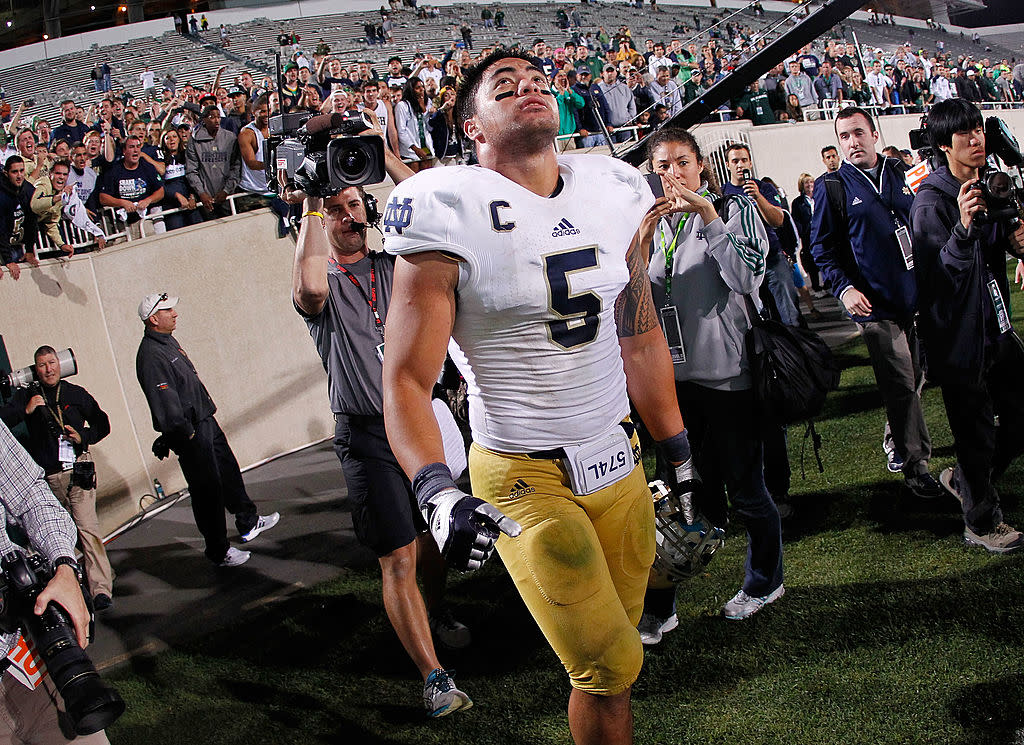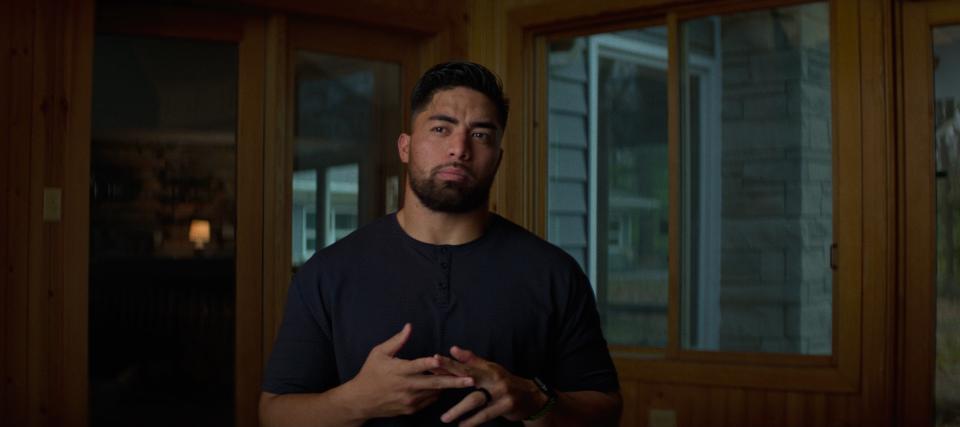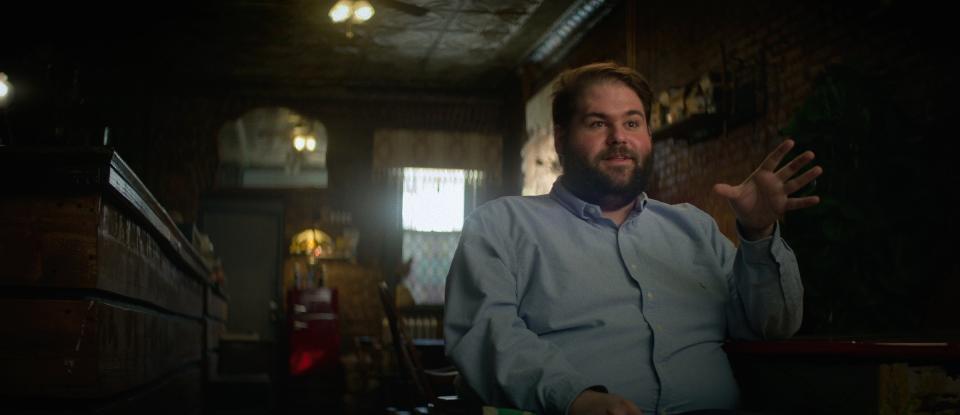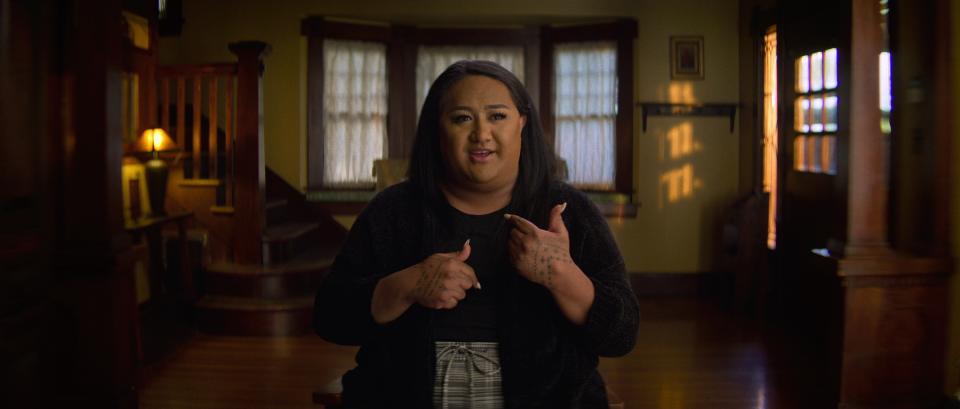Manti T'eo on Sharing His Story in a New Netflix Documentary—and the Power of Forgiveness

Manti Te'o of the Notre Dame Fighting Irish reacts after Notre Dame beat Michigan State 20-3 at Spartan Stadium on September 15, 2012 in East Lansing, Michigan. Credit - Gregory Shamus—Getty Images)
Last Saturday Manti Te’o watched the new Netflix documentary Untold: The Girlfriend Who Didn’t Exist, surrounded by family in his home in Utah. The film, which was released publicly on Tuesday, covers a catfishing scandal that rocked the U.S. nearly a decade ago. Te’o, a Heisman trophy finalist during his senior year at Notre Dame, enjoyed what appeared to be a storybook season, leading Notre Dame to the national championship game after overcoming twin traumas: the deaths of his grandmother and his girlfriend, Lennay Kekua, in September of 2012. One problem: Kekua did not exist. Ronaiah Tuiasosopo, nicknamed Naya, had developed an online identity as Kekua and carried on a relationship with T’eo, who found out about the hoax in December of that year. Deadspin revealed it to the public via an explosive investigation published in January of 2013, following Notre Dame’s 42-14 loss to Alabama in the title game.
In the film Tuiasosopo, who now identifies as a transgender woman, explains how she carried out the deception. Te’o describes how the embarrassment caused bouts of anxiety once he joined the NFL. Te’o really teared up when the film showed highlights of his Notre Dame years, before everything unraveled. “Just remembering those years and just being who I was at that time, the people that were around me, the love, the support, it was definitely an emotional experience,” Te’o, wearing a white Notre Dame zip-up jacket, told TIME in a Zoom interview Wednesday. “It was a healing experience.”
The film is resonating. Untold: The Girlfriend Who Didn’t Exist, was listed as Netflix’s No. 2 movie on Aug. 17. Te’o talked to TIME about lessons learned from the documentary, his biggest regret, and what the future may hold.
(This interview has been condensed and edited for clarity)
TIME: Why are you telling your story now?
Te’o: When I first got approached, right when it happened, I was still not in the space to do anything. I was still ashamed. I was still embarrassed. So I knew that, one, I don’t want to say anything and two, if I were to say something, it wouldn’t be the truth because I’m still ashamed of it.
In 2017, [New Orleans Saints defensive end] Cam Jordan took us to a Jay-Z concert in New Orleans. And Jay-Z said, “You cannot heal what you don’t reveal.” And so from that point on, I told myself, “I want to have these hard conversations with people that want to have them.” I just got to the Saints. I had a lot of new teammates and they had a lot of questions and so it was a great opportunity to share. I realized, as it happened, l started get a little bit more strength. Not necessarily comfortable, but I was just getting used to it. More importantly, the people that were asking, there was some love and some empathy and some support. So I suddenly was like, “Man, I’m stronger now.”
Fast-forward three years later when [The Girlfriend Who Didn’t Exist co-director] Tony Vainuku reaches out. He and I had the same conversation and he just listened. He said, “Bro, you’re ready. You’ve got to tell it.” I am ready to tell it because I’m at peace with everything. I’m not ashamed. And if Netflix and Tony Vainuku and [co-director] Ryan Duffy are willing to tell the story, the whole story, I’ll do it.

What’s has been some of the feedback, good and bad, since the film’s release?
It’s been all positive. It’s been amazing, bro, because it’s been global. People in France, people in Germany, people in Africa. I’ve gotten messages in different languages. I don’t know what they mean. But I can tell by the emojis it’s all love.
So many people have said, “Hey man, similar things happened to me,” whether it be a catfishing incident or a trial within a family, divorce, a loss of a loved one. And that different parts of the documentary really helped them to have a different perspective. That’s all I could hope for, is to help people go through what they go through by seeing how my life went.
I want to challenge everybody to tell people that you love them. Don’t wait. We live in a society where funerals are the place where the most “I love yous” are said. If you’re walking on a street and you can help somebody, do it. It’s not going to cost you anything. But to that person, It means the world.
Read more: The NFL Keeps Fumbling and Congress Keeps Punting
And what, for you, was the most surprising revelation in the documentary?
The most surprising for me, honestly, was Deadspin. I just always knew Deadspin as the people that leaked it. But when I watch what they were trying to do, there was a level of understanding there for me. It was like, “OK, you were just trying to report facts.” And I respect that. You’re just trying to do your job the best way you could. I don’t hold that against you.
That’s really interesting, because I’ve seen some social media vitriol directed at Timothy Burke and Jack Dickey, the former Deadspin reporters who wrote the piece, since the film’s release. Basically blaming them for ruining your life. But after the documentary, you don’t hold those sentiments?
I don’t think there’s one person or one thing that was a sole person or company that ruined everything. It was just a whole tidal wave of different people, different events. So for me to see [the Deadspin reporting process], it was uncomfortable. But I was like, “OK, I can see that you’re just trying to do your job.”

In the film, Burke and Dickey made the point that they thought their story would serve as a condemnation of the mainstream media’s inability to do basic fact-checking. To realize, for example, that no Lennay Kekua had graduated from Stanford. But instead, people focused on things like whether you were in on the hoax, or speculation about your sexual orientation. Looking back, were you surprised by that outcome?
Yeah. As an athlete, you’re like, “I’m probably going to hit ESPN. Maybe the local news.” That’s about it. But this went to everybody. It was surprising, to say the least. I was like, “Where are you getting these facts from?” But I can’t control what they say. I’m going to control what I can control, and then we’ll do the best with that.
What is your message for Naya Tuiasosopo?
Forgiveness. For me, forgiveness is powerful because, one, it’s not only for the person that you’re forgiving. It’s also for yourself. It’s not like Naya reached out to me and said, “Please forgive me.” Never have I been asked by Naya to forgive Naya. It was given already, because I knew that’s what I needed to do. And the next part is, forgiveness is unconditional. There’s so much power and peace that comes with that. If you want to have peace in your life and take control of your life again, forgive.

While you made a nice living during your seven-year NFL career, it’s pretty clear from the film that the catfishing incident prevented you from becoming a first round draft pick, and caused anxiety in your initial years with the San Diego Chargers. It’s reasonable to imagine you making millions more if this had never happened. You also talked about an incident where Naya, talking as Lennay Kekua, said your name between breaths on the other end of the phone line, leading you to believe that you were essentially helping prolong her life. There’s a lot of trauma there. How did you get over that hump to where you could forgive?
During that time, I carried this anger with me. That was drowning me. My whole world was just a spinning hurricane. And I was desperately in search of peace. I exhausted everything I could do, bro, in order to try to rediscover who I was. I would put quotes on my mirror in my apartment. I made this book, called Dear Manti. Every time my siblings and my parents would come visit, I would give it to them. I’d say, “Hey, before you guys leave, write write me a letter.” Because I would need to remember. I would watch old film of me in high school. I tried to remember how how I felt, the confidence. I realized that the only way that you could gain peace is to let go of anger, to forgive. People who harness this feeling of hate, of anger or revenge, you are giving somebody else power over your life to dictate how you live your life. And what an expensive price that is.
Would you ever get in a room with Naya to talk about what happened with the catfishing incident? To sort of hash things out?
I’m not too sure.
Why?
Well, because at the end of the day, you still did this to me. Everything that I wanted to say to Naya I was able to say it in the most genuine way possible for me. “Hey, listen, I forgive you. And I hope you and your family are OK. And I’m OK. And we can we can go our own ways.” I have no ill will. Everything that I wanted to say, everything that I wanted to do, I think the documentary covers all of that.
What’s next for you?
I don’t know. The one thing I know for sure is that there’s this little baby girl right next to me—she’s asleep. My wife’s here. We’re expecting a son. My wife’s in nursing school. I’m supporting her in her nursing school. She wants to open up a med spa. I’m all for that. So if anybody wants some med spa work in like four years, I think my wife will have herself up.
But honestly, bro, I just want to raise good human beings. When they go to school. I want them to look out for the kid that’s sitting by themselves at the cafeteria and go sit by him. I want them to help a kid who drops their books, to pick them up.
You last played for the Chicago Bears practice squad in 2020, and are listed as an NFL free agent. Is football something you’re still pursuing? Or are you done?
Yeah, I’m done, bro. That life got me. I’m addicted to it. I want to be here to raise my kids. I give so many of my teammates who have families credit, and their wives even more credit. The amount of time that we spent away from from families, I can’t imagine being away from my kids that long.
If you had one regret through all this, one thing you would do different, what would it be?
The only regret I have is, there are a lot of people after 2013 that genuinely loved me. There were a lot of people that came to support me and were offering their help. But because I was in a dark place, I couldn’t receive that help. I didn’t appreciate that help.. So there are a lot of people that were genuinely there to help me that I didn’t appreciate the way that I should have. I wished that I would have handled that love and that assistance more carefully.
That’s interesting, because the easy answer to that question would be, I wish I didn’t start talking to Lennay Kakua. Correct me if I’m wrong, but it doesn’t sound like you second-guessed that decision a ton.
I mean, I wish this whole thing didn’t happen. But my biggest regret, personally for me, is that myself and my actions affected somebody else in a negative way.

